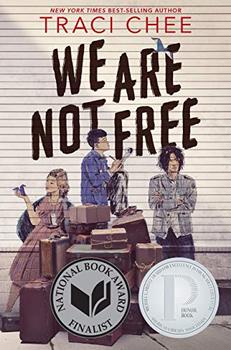Summary | Excerpt | Reading Guide | Reviews | Beyond the Book | Read-Alikes | Genres & Themes | Author Bio

This article relates to We Are Not Free
 In Traci Chee's young adult historical novel We Are Not Free, which follows 14 Japanese American teens from San Francisco through World War II, two young men in Topaz detention camp, Mas and Twitchy, decide to volunteer for the army. Japanese American men were unable to serve until early 1943; the American government had considered them enemy aliens since the bombing of Pearl Harbor. Director of the Office of War Information Elmer Davis urged President Franklin D. Roosevelt to reverse the ban on soldiers of Japanese descent in a 1942 letter, in part for propaganda reasons, but also because he believed most Japanese Americans were loyal citizens and deserved to serve if they wished.
In Traci Chee's young adult historical novel We Are Not Free, which follows 14 Japanese American teens from San Francisco through World War II, two young men in Topaz detention camp, Mas and Twitchy, decide to volunteer for the army. Japanese American men were unable to serve until early 1943; the American government had considered them enemy aliens since the bombing of Pearl Harbor. Director of the Office of War Information Elmer Davis urged President Franklin D. Roosevelt to reverse the ban on soldiers of Japanese descent in a 1942 letter, in part for propaganda reasons, but also because he believed most Japanese Americans were loyal citizens and deserved to serve if they wished.
But once they enlisted, Japanese American soldiers were not incorporated into other units; they were segregated in the 442nd Regiment. The unit was made largely of Japanese Americans from Hawaii, supplemented by over 2,000 men from the mainland detention camps. Among the 442nd's recruits was Daniel Inouye (1912-2012), former Senator from Hawaii.
In the chapter narrated by the character Twitchy, readers march with the Regiment to battlesites like Livorno, where the young Japanese Americans were lauded by their superiors: "They were superb! They showed rare courage and tremendous fighting spirit. Everybody wanted them," said General George Marshall. Sent to France, the Regiment arrived in the Vosges Mountains in late October 1944. They anticipated a short break — but then word came that the First Battalion, made up largely of men from Texas, was in trouble. The Americans had been gaining ground against the Germans, but the battalion became separated from their fellow combatants and were soon surrounded and overwhelmingly outnumbered by German forces. A fighter squadron managed to airdrop supplies, but ground troops could not reach them. Soldiers later heard that Adolf Hitler himself had sworn that this was a battle he would not lose, no matter how many Germans died. After days of fierce fighting and high casualties, the Japanese American soldiers, outnumbered four to one, pushed through the enemy lines and rescued the "Lost Battalion," over 200 American soldiers.
Altogether, throughout the war, the 442nd Regiment lost 600 young men. For its size (18,000 soldiers), it was the most decorated unit in the history of the United States with 9,486 Purple Hearts, 21 Medals of Honor, and seven Presidential Unit Citations. The Medals of Honor were bestowed in a ceremony in 2000 by President Clinton, who said of the 442nd soldiers: "They risked their lives above and beyond the call of duty. And in so doing they did more than defend America. In the face of painful prejudice they helped define America at its best."
The 442nd Regiment with German POWs, courtesy of Sons and Daughters of the 442nd Regimental Combat Team
Filed under People, Eras & Events
![]() This "beyond the book article" relates to We Are Not Free. It originally ran in September 2020 and has been updated for the
March 2022 paperback edition.
Go to magazine.
This "beyond the book article" relates to We Are Not Free. It originally ran in September 2020 and has been updated for the
March 2022 paperback edition.
Go to magazine.
Your guide toexceptional books
BookBrowse seeks out and recommends the best in contemporary fiction and nonfiction—books that not only engage and entertain but also deepen our understanding of ourselves and the world around us.